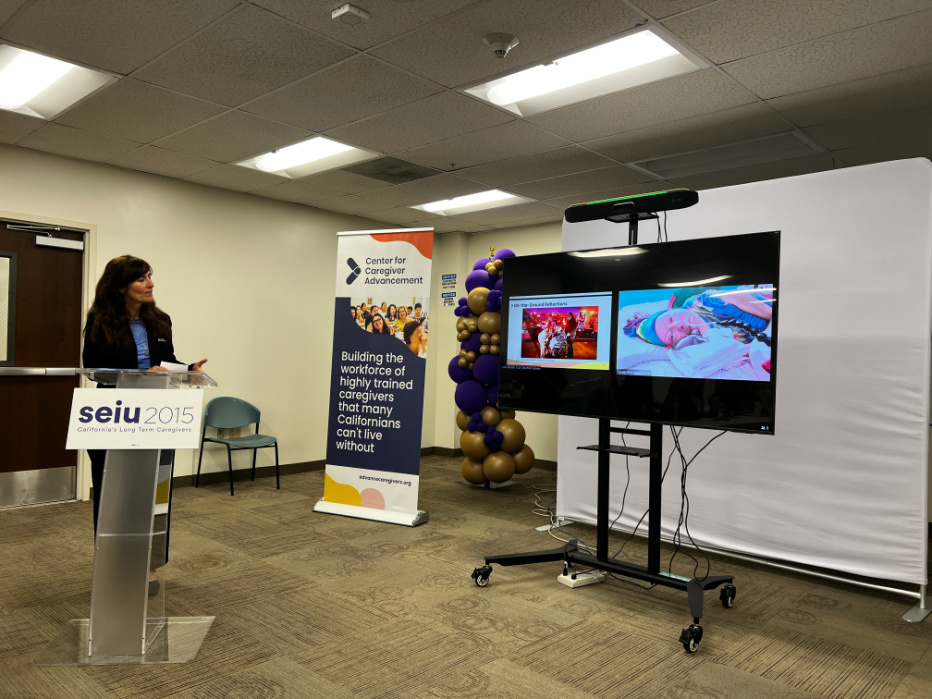Consumers As Partners in Developing More Impactful Training for Caregivers
Over the past 25 years, the Center for Caregiver Advancement (CCA) has built a successful track record of providing high-quality training to caregivers in California. A key component of our success as a provider of accessible training for In-Home Supportive Services (IHSS) caregivers across the State is our emphasis on person-centered care to benefit consumers.
We believe that the consumers who receive care in a home setting through the IHSS program should have a say in which types of caregiving skills would provide the most benefit to them. At CCA, we strive to work with consumers as partners, gathering their feedback and guidance as we develop our caregiver training programs.
CCA Aims to Include Consumers in Advisory Committees & Training Programs
CCA works with program partners to establish Stakeholder Advisory Committees (SACs) that include consumers. The SACs are designed to guide the implementation of the grants CCA receives for training programs, and to ensure the programs reflect the needs of caregivers and care recipients.

These committees aim to bring together workers, consumers, union representatives, community organizations, and program leaders to provide input, share insights, and strengthen collaboration. The committees for each program typically meet monthly as the program launches, and then transition to quarterly meetings for the remainder of a program support grant.
A unique training program developed in partnership with the Personal Assistance Services Council in Los Angeles (PASC LA) recently included consumers (care recipients) in the training process. The courses offered in partnership with PASC LA were Alzheimer’s Disease and Related Dementias (ADRD) and Emergency and Disaster Readiness (EDR). Both courses were provided online in English, Spanish, and Armenian, with 1,800 total seats available (including up to 30% reserved for IHSS consumers).
A Consumer Advisory Committee (CAC) ran concurrently with the PASC LA program, highlighting the importance of respectful, two-way communication between caregivers and consumers, insights that will shape future training.
Gathering Consumer Feedback Directs Our Caregiver Training Curriculum
At CCA, we believe that consumer direction can, and should, help guide caregiver training. That is why we gather their feedback at the close of our training programs. Through post-training focus groups, we get first-person feedback from both caregivers and care recipients. This information helps us understand what impact professional caregiving skills have on a recipient’s health outcomes, quality of life, and overall sense of well-being.
We ask consumers a range of questions, such as:
“Did the quality of your home care improve after your IHSS provider completed the caregiver training course at CCA?”
“How have you seen your IHSS provider apply the skills they learned in CCA’s caregiver training course?”
The consumer’s responses help us evolve and refine our curricula in future training programs.
What We Hear from Care Recipients in Our Community
Here is what a few consumers had to say about the training their caregivers received:
“My caregiver is my right hand and a crucial member of my care team. She does everything to support my health. She loved this training! It boosted her skills and confidence, improving the care she provides me overall. Thank you for this opportunity!”
-Consumer, IHSS Member, L.A. Health Care Member
“Since my IHSS caregiver completed training, she has learned the right way to dress me safely and efficiently. She also seems more patient and shows more empathy regarding my situation.”
-Consumer, IHSS Member, L.A. Health Care Member
“I have diabetes and high cholesterol. My caregiver has learned how to improve my diet to help manage these health conditions. He also has gotten better at explaining my medications and other details of my care.”
-Consumer, IHSS Member, L.A. Health Care Member
“Since she took this caregiver training, my caregiver learned more about nutrition, including the best foods, portions, and quantities. She also talks with me more about going outside and getting exercise. I feel like we live a better life now, and I feel safer.” (Translated from Spanish)
-Consumer, IHSS Member, L.A. Health Care Member
“When I need assistance in moving around, my trained caregiver moves me safely. She also pays attention to my daily diet and nutritional status, which has improved my overall health. She can also advise me on my assistive tools and supplies. I have a lot of confidence in her.”
— Consumer, IHSS member
Research Studies Show the Benefits of Skilled Caregiving
CCA has collaborated with third-party researchers from academia and various organizations who study the impact of in-home caregiving on public health. A study from researchers at the University of California, San Francisco (UCSF) showed that when CCA-trained caregivers applied the skills they learned in our training courses, this resulted in:
- 20% fewer complications for consumers with chronic illness
- 35% increase in consumer adherence to care plans
- 40% increase in consumer satisfaction with their home care

These positive results for consumers inspire us to continue seeking funding that supports our efforts to build caregiver skills around chronic illness, medication/therapy adherence, nutrition, exercise, safety, emergency preparedness, and other caregiving essentials.
Caregiving is a two-way street. At CCA, we understand that consumer direction and voice are key to building caregiver training programs that deliver positive impact for caregivers and consumers alike.
Related Reading: https://advancecaregivers.org/caregiver-dennisse-hernandez-is-ready-for-the-next-emergency-or-disaster/

